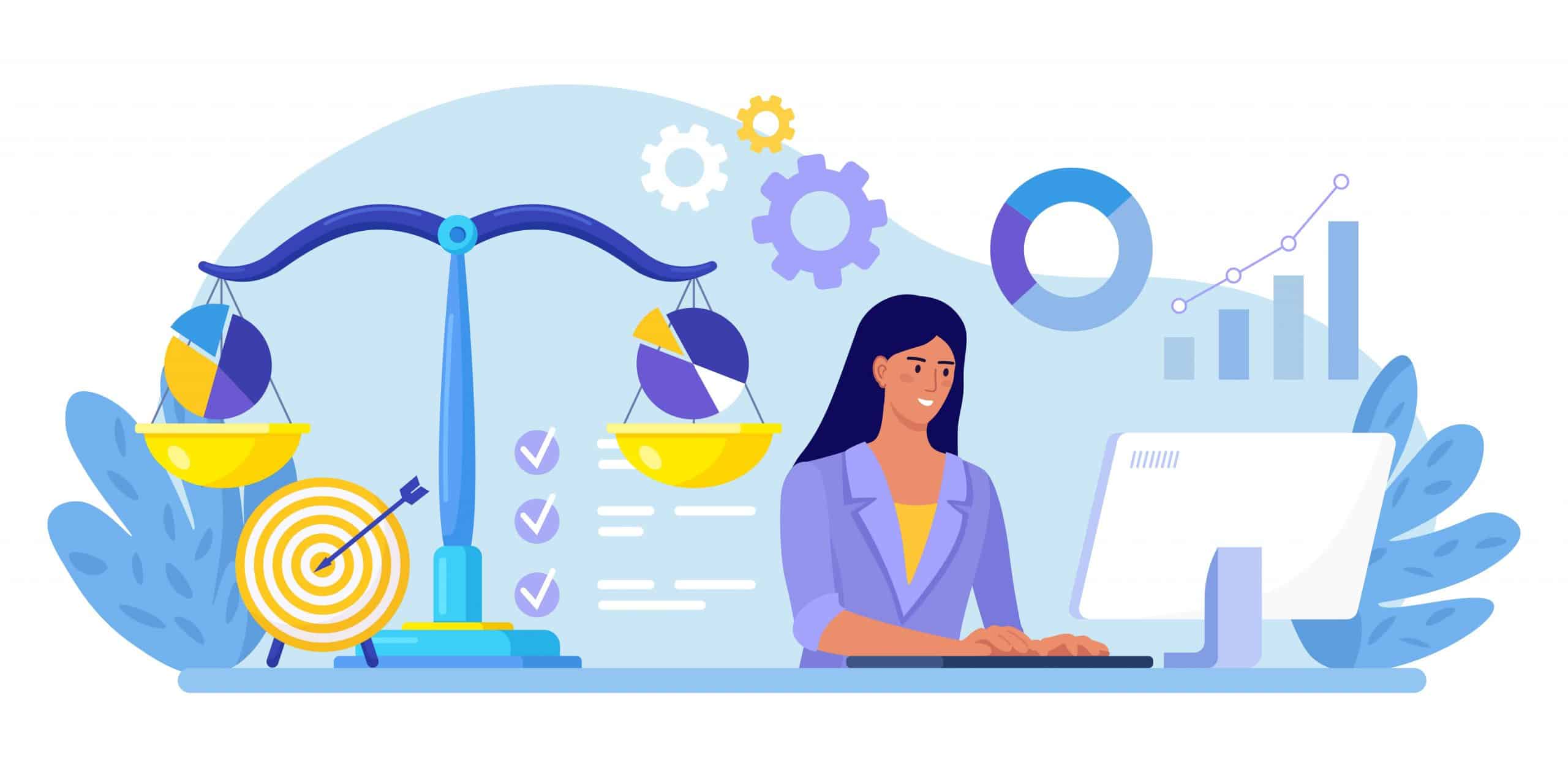How to Choose The Best eCommerce Platform all you need to know
eCommerce has become a crucial component of international retail. Following the Internet’s development, buying and selling goods underwent a digital transformation similar to many other industries. As a result of ongoing digitalization, today’s customers benefit from the convenience of online transactions.
The number of individuals making online purchases is steadily rising. Statista reports that the retail eCommerce market topped 5.7 trillion dollars worldwide in 2022 and is anticipated to increase by 56%, reaching nearly 8.1 trillion dollars by 2026. Giving clients access to an online store is a must rather than just a nice-to-have option.

To succeed in eCommerce, you need to provide a user-friendly, attractive, and secure online store experience for buying products on the Internet. So, how to grow your eCommerce business? An eCommerce platform is the foundation of your online store. An efficient and easy-to-use platform helps increase traffic, revenue, and ROI. An experienced and reliable outsourcing vendor for eCommerce platform development is essential for the quality of your solution.
In this article, we’ll use GetTrusted’s expertise to review the benefits of eCommerce platforms, their types, must-have features, and common mistakes to avoid when choosing the right solution for your company. We will connect you with the top three verified software development partners in your niche to help you build or integrate the best eCommerce platform that most closely matches the needs and requirements of your business.
What Is an eCommerce Platform?
An eCommerce platform is software that makes buying and selling goods online easier. Businesses use eCommerce platforms to manage their websites, sales, operations, and marketing activities. Typically, eCommerce platforms give businesses the robust features they need to function while integrating with popular business tools. It allows companies to centralize their operations, manage their enterprises most efficiently, and plan an eCommerce strategy.
All eCommerce platforms offer customers the following three essential functions:
- A search tool that makes it simple for users to find products online;
- A cart to help buyers manage their orders;
- A payment system to facilitate online purchases.
Numerous platforms also use data analytics to give businesses information about the behavior of their customers so they can enhance their digital marketing and day-to-day operations.
Nowadays, consumers can buy almost anything online, thanks to the eCommerce industry. According to Shopify sales data, popular eCommerce categories include model train sets, matcha, dog toys, and power tool accessories. BigCommerce, Shopify, WooCommerce, and Magento are some of the top eCommerce platforms.
Benefits of Investing in an eCommerce Platform
It is only possible to compete online with an efficient eCommerce platform. The proper eCommerce platform can aid in streamlining interactions between your company’s clients, customers, and staff. Let’s review the advantages that eCommerce platforms offer.
Scalable All-In-One Platform
ECommerce platforms use a unified system for inventory, point-of-sale, customer service, analytics, and more. They offer business owners a single place to manage both the front-end shopping experience and the back-end procedures. Most platforms have the options to manage daily tasks and sales activities.
An eCommerce platform also offers services to help you advance your store as your company expands and scales up. Several eCommerce platforms provide flexible shipping services, various language and currency support, and marketing tools to assist you in growing your business.
Seamless User Experience
ECommerce platforms typically incorporate various services and follow best practices for offering each. An eCommerce platform’s performance, user interface, payment processing, and store administration requirements benefit you and your customers. User experience is crucial for expanding companies in highly competitive industries where delays, interruptions, and downtime can drive clients away.
An appealing and consistent user experience enhances user engagement and improves the perception of your brand. When customers don’t have to put in much time and effort to search for what they need, it drives their purchasing choices. Moreover, improved conversion rates and increased user trust are direct results of superior user experiences.
Streamlined Order Management
ECommerce platforms automate and integrate order management at every stage of the order journey. It enables businesses to offer standardized customer experiences at scale and across all channels. ECommerce platforms allow operators to handle orders from various sales channels and fulfillment points. It aggregates data within a single interface and provides automation between service providers.
Without efficient order management, most eCommerce companies can’t expand. Customers anticipate quick, inexpensive, and customized order fulfillment. Therefore, there is no room for human error. Order management automation through eCommerce platforms allows employees to prioritize improving the brand experience, sorting through backorder Stock Keeping Units (SKUs), contacting carriers, or printing paperwork.
Types of eCommerce Platforms
Which eCommerce platform should I use? If this question bothers you, let’s start answering it by reviewing the types of eCommerce platforms. Here are five primary categories to choose from.
Custom eCommerce Platforms
Building your own custom eCommerce platform is one of the available options. It can be your choice if your company is narrowly specialized and has a unique set of requirements and criteria that no commercial eCommerce platform provides. If you stick to this type, you will need to hire an experienced vendor to design and develop it.
GetTrusted will connect you with the top three verified vendors in your niche for your eCommerce platform development. We partner only with the best agencies and software development companies, carefully checked by our Due Diligence Department. Our platform does not host individual freelancers to ensure the highest quality, security, and reliability.
Traditional Platforms
Traditional eCommerce platforms have a preset user interface for administrators and end users. To make minor changes in the data or user experience, developers have to modify the database, the code, and the front end, causing significant commercial risk. With this type of solution, you pay a license fee upfront and then renew it annually. Oracle Commerce, IBM Digital Commerce, Kentico, and Hybris are examples of traditional platforms.
If you choose this type of eCommerce platform, you will need a team of developers to customize and install the platform on-premises or in the cloud. GetTrusted can help you to find a trustworthy software development partner with the relevant expertise while vetting the staff to guarantee the best quality and save your budget.
SaaS Platforms
Software as a service (SaaS) is an approach to selling goods online through a collaboration with a service provider that offers access to the SaaS eCommerce platform. The majority of SaaS eCommerce solutions are built using a single codebase. A typical eCommerce SaaS platform provides the same technology to all users for a fixed monthly charge that includes server use, upkeep, security, and upgrades.
Modern SaaS platforms also enable customization and configuration within the application. They allow minor updates and improvements without technical support. Still, SaaS eCommerce platforms require professional software developers’ assistance to cater to specific business needs.
Cloud Platforms
These platforms use cloud-based technology to manage and scale data storage, hosting, and applications for digital commerce, such as virtual payments, inventory management, and product information management. This type is quite hazy. Some traditional and open-source platforms attached to a hosting platform now identify as cloud platforms. Magento Enterprise Cloud, Demandware, Salesforce Commerce, BigCommerce, and Volusion platform are a few examples.
Whether you require an online store built on Shopify, BigCommerce, or any other eCommerce platform, GetTrusted will connect you with trusted vendors with experience working with the specific service provider. Understanding that the developers’ expertise is the critical competitive advantage, we carefully select highly specialized teams to work on every project.
Cloud-Hosted vs SaaS eCommerce Platforms: Why They Aren’t the Same
Many believe a cloud-hosted platform is the same as a SaaS product. Like traditional and open-source platforms, cloud-hosted platforms can be legacy systems hosted on a cloud platform. Many of these platforms still need maintenance and upgrades.
Additionally, using a cloud-hosted eCommerce platform requires the same initial development and customization as using a traditional or open-source platform. Therefore, you need to hire a technical assistant to complete this work. The platform is yours after this is finished, though.
SaaS solutions don’t require maintaining a physical server or a cloud-based hosting company. You only pay a monthly fee to access the previously created software program through your browser. Additionally, unlike cloud-hosted solutions, you don’t need to worry about software maintenance because the SaaS provider handles it.
Here’s a comparison table to better visualize the differences between SaaS and cloud-hosted eCommerce platforms:
| Aspect | SaaS eCommerce Platforms | Cloud-Hosted eCommerce Platforms |
| Hosting and Maintenance | Hosted and managed by the SaaS provider | Self-hosted by the business owner |
| Scalability | Typically offer flexible scalability options | Scalability depends on the chosen hosting infrastructure |
| Customization | Limited customization options | High level of customization and control over the platform |
| Updates and Upgrades | Automatic updates and upgrades provided by the provider | Manual updates and upgrades managed by the business owner |
| Technical Expertise | Minimal technical knowledge required | Advanced technical knowledge may be required |
| Cost Structure | Monthly subscription fee | Upfront and ongoing costs for hosting and maintenance |
| Support and Maintenance | Offered by the provider | Managed by the business owner |
| Integration Options | Pre-integrated with third-party services and plugins | Flexible integration options with external services |
| Time to Market | Quick setup and deployment | Longer setup time due to infrastructure and customization |
| Security | A high level of security is ensured by the SaaS provider | Security depends on the hosting infrastructure and setup |
It’s important to note that the specific features and capabilities vary between different SaaS and cloud-hosted eCommerce platforms. This table represents the primary differences between the solutions.
The Costs to Build, Maintain, and Update Your eCommerce Platform
Many companies need to pay more attention to the true costs of maintaining an eCommerce site when choosing an eCommerce platform. While the upfront expenditures of development are transparent, there are other expenses to keep an eye on:
- Maintenance;
- Upgrades;
- New features or enhancements;
- UX changes.
Maintenance
If you decide to use a traditional open-source platform, you need to handle maintenance to keep your eCommerce site operating correctly. These maintenance expenses can vary, and you’ll need to engage technical assistance, depending on the size and complexity of your eCommerce site. On the other hand, with SaaS platforms, maintenance is taken care of in exchange for set monthly fees.
Upgrades
Open-source platforms require you to obtain and install updates as soon as they are available. Your platform is vulnerable to hackers and online attacks if you don’t install these upgrades on time. Again, since installing these changes requires technical expertise, you will need to hire outside specialists. Any upgrades for SaaS platforms are included in the monthly fees, much like maintenance.
New Features and Enhancements
Consumer behavior evolves over time. Therefore, you need to ensure that your eCommerce site remains relevant by adding new features and enhancements to your solution as required. It will go on top of maintenance and upgrade costs.
UX Changes
You might need to modify your eCommerce platform’s overall user experience and introduce new features and improvements. Once more, this depends on modifications in consumer trends and behavior. If your existing eCommerce system becomes too inflexible, you will need to switch platforms and use a system that allows you to make these UX adjustments. It can be an expensive process.
How to Select an eCommerce Solution: Factors to Consider
What is the best eCommerce platform? In this section, you will find some essential factors you should pay attention to when choosing an eCommerce platform.
Support
Customers can have trouble accessing your website and making purchases during software failures, server breakdowns, or downtimes. These can not only result in a loss of revenue for your business but also harm your brand’s reputation. You need emergency technical support from your eCommerce platform to resolve such issues quickly and get your store operating normally as soon as possible.
This is why choose a platform that offers 24/7 support. Figure out all support concerns of a platform you are considering before deciding. Is technical assistance available all the time or only during certain hours? What channels do they offer: phone calls, online chats, self-service, etc.? How many levels of support are available, and what are the costs?
Scalability
Your eCommerce company will expand over time. Your company’s growth shouldn’t be limited by an eCommerce platform that is challenging to scale. Therefore, you should choose a platform that is flexible enough to grow seamlessly with your business. Moreover, the platform shouldn’t charge excessive costs for adding new features or storage to accommodate your growing business needs.
Vendor Experience and Expertise
You need to verify the vendor’s technical expertise and experience to ensure they can handle your requirements, demands, and complexity. Additionally, ensure they know and have experience working in your sector. Spend time investigating case studies, user testimonials, and forums to determine whether the vendor is qualified to do tasks other than development.
GetTrusted only collaborates with carefully vetted, legitimate businesses specializing in outsourcing work to ensure the highest quality and security. We do not host any individual freelancers on our platform. Therefore, when choosing our services, you can rest assured that we connect you only with the top verified vendors.
SEO-Friendliness
Customers will only visit your website if they can find it in search results when looking for products similar to the ones you sell. Search Engine Optimization (SEO) is necessary to increase your site’s visibility and search engine ranking.
Therefore, the platform you choose should offer a range of SEO-related features, such as:
- Adding a blog to your website,
- Using your domain name,
- Enabling customers’ reviews,
- Supporting Google site maps.
When the platform includes these functionalities, it directly affects your site ranks in search engine results.
Security
Security is undoubtedly the most crucial factor to consider. Customers will only make purchases from your eCommerce site if they are confident about the security of their financial information from hackers and data thieves. Your platform requires vital security components like Payment Card Industry (PCI) compliance, a Secure Sockets Layer (SSL) certificate, fraud protection, and data backups.
The platform should also conduct regular audits to identify potential security vulnerabilities to make the required adjustments to safeguard clients against hazards. The best option is to use a platform created using an object-oriented programming language that has embedded security protocols.
Mobile-Friendliness
Today, consumers expect to be able to shop from any location. Consequently, a mobile-friendly platform is a must. According to Statista, the amount spent on mobile retail eCommerce in the United States topped 387 billion dollars in 2022. While the conversion rates for mobile phones in the US are still lower than those for desktops, almost one-third of internet purchases in the country are made using a mobile device.
The top eCommerce platforms allow multichannel selling and have a user-friendly mobile app. Ensure that your eCommerce platform is functional on most smartphones and tablets. This way, you will satisfy the requirements of your clients who mainly use their mobile devices for shopping, are away from their desktops, or simply react to your enticing advertisement that appears on their mobile screens.
10 Must-Have Features to Look for in an eCommerce Platform
Each eCommerce platform offers a different set of features and capabilities. However, certain features are a must for every successful eCommerce site. The best platform to build eCommerce website should offer the functionality listed below.
Solid Catalog
Your product catalog is the core of your stock. It should be simple to navigate and update. Include product bundles and cross-linking across product pages. More importantly, ensure that your product catalog complies with the standards for your industry. For instance, if you work in the fashion or clothing industry, your product catalog must have a function that enables customers to choose a product’s size and color.
Website Personalization
Online shoppers require a personalized experience. Look for eCommerce systems with recommendation engines that deliver clients tailored lists of recommended products based on their past purchases and the products they’ve been looking for.
Flexible Pricing
Offering promotions, deals, or discounts is a great way to attract new customers and increase revenue streams. Another thing to think about is the ability to support different currencies. You can also enable flexible fees depending on the location of your clients.
Flexible Shipping
Recent years have seen a significant change in shipment demands. The clients request that items be delivered the same day as ordered or the next day. A distribution and logistics business should provide the platform with firm support. Enable connectivity with fulfillment businesses and offer zone-based shipping restrictions.
ECommerce Analytics
You should keep an eye on various essential eCommerce metrics and KPIs. The best way to do it is with a built-in analytics system. Fortunately, most eCommerce platforms come with their own analytics tools. Best eCommerce software allows you to sync the data from the eCommerce platform with another analytics platform to access more in-depth analytics.
Facebook Integration
You can connect your products to Facebook, Instagram, and Messenger by integrating with your Facebook business account. It will allow you to use a catalog created for various commercial purposes, such as showing products in a collection ad or tagging items on Instagram.
Google Merchant Integration
Businesses can upload and update product information using Google Merchant to appear in the relevant Google Shopping results. Increasing traffic to your product listing page is beneficial. This function will help you reach clients who don’t visit your website.
Customer Review System
Integrated customer review systems or third-party integrations that enable consumer ratings and reviews can significantly impact your conversion rate. Favorable evaluations and user-generated content on your website improve buyers’ trust and faith in your company.
Multiple Payment Gateways
Having PayPal, a credit card, and a debit card as payment options enhances conversion. Additionally, to expand your eCommerce business globally, you should use local payment gateways to win regional marketplaces.
Automatic Tax and Account Calculation
If your company does global eCommerce, you must adhere to each country’s currency requirements and tax laws. Tax law violations can result in a public court proceeding. The automatic tax and account calculation feature helps you to follow numerous regulations and avoid unintentionally breaking the law.
5 Common Pitfalls to Avoid When Choosing an eCommerce Platform
Here are some common mistakes online businesses tend to make when choosing an eCommerce solution.
Investing in a Rigid Monolithic Platform
If you choose a platform based on a clunky monolithic architecture, its performance will be slow. Additionally, updating a tiny piece of your platform will require the deployment of the complete system, which can cause lengthy downtimes.
Instead, choose an eCommerce platform based on a microservice architecture. These are simpler to maintain, upgrade, and administer because each component runs independently and communicates with the others via APIs. It makes working with your team and serving your consumers more effective.
Choosing an Unscalable Platform
The platform that is challenging to scale limits your business growth. Usually, such platforms rely on poor infrastructure or local servers, making adding new features and improvements as needed challenging. Instead, choose more flexible eCommerce solutions that offer multi-tenancy and multi-site.
Going for Too Many Features
This pitfall also concerns scalability. When investing in a platform with considerably more functionality than you need, you are paying for features you are not using and get a poor value for your money.
Select a platform allowing you to add additional features and capabilities as your organization expands while meeting the minimum “must-have” needs first. It makes it easier for your spending to stay in line with the expansion of your company.
Not Having Clear Objectives
Setting clear and measurable objectives before choosing an eCommerce platform is essential. You can waste a lot of time and choose the incorrect eCommerce platform if you don’t have pre-defined goals at the start of the selection process.
Here are some examples of worthwhile goals for an eCommerce store launch:
- Open an online store within three months;
- Gather 1,000 consumers’ contact details in your target market;
- Achieve a minimum of 10,000 sales in the first quarter.
Customizing Incorrectly
Some businesses decide on a rigid platform and then attempt to tailor their internal requirements and systems to meet the platform. It is the wrong way to do customization. You need to know your objectives and choose a platform that matches most of your requirements and is flexible enough to be customized to meet the rest of your business needs.
Thrive in eCommerce with GetTrusted
To succeed in eCommerce, you must provide customers with a convenient, appealing, and safe online shopping experience. A nice-looking, straightforward, and secure eCommerce platform is at the heart of your online business. The seamless user experience and streamlined order management of your platform will increase website traffic, revenue, and ROI. Still, choosing the best eCommerce solution can be challenging.
GetTrusted will assist you in locating a reputable software development partner who can build or integrate an eCommerce platform that best meets the goals and specifications of your company. GetTrusted will connect you with a team of experts with substantial experience, work within your budget and location, and produce high-quality work, vetted and backed up by our escrow service. GetTrusted only works with top agencies and verified outsourcing companies to reach the highest quality possible. We do not host any individual freelancers on our platform.
Here is how the GetTrusted process works:
- You fill out the form specifying your requirement;
- We schedule a call to discuss your project in more detail;
- Within 48 hours, you get a project budget and timeline estimate;
- After your approval, we will connect you with the top three verified companies with solid expertise in your niche.
- As an escrow service, we guarantee high quality and charge you only after you approve the product.
Contact us today to discuss your eCommerce solution and connect with the best-vetted vendors!










